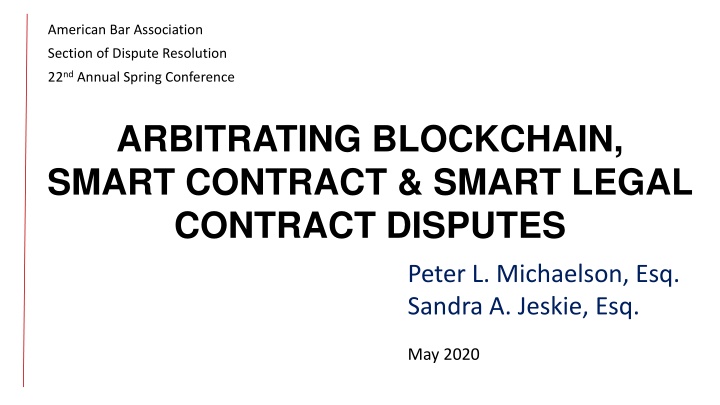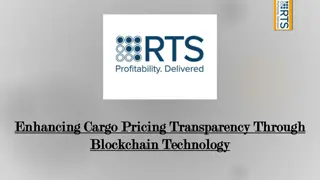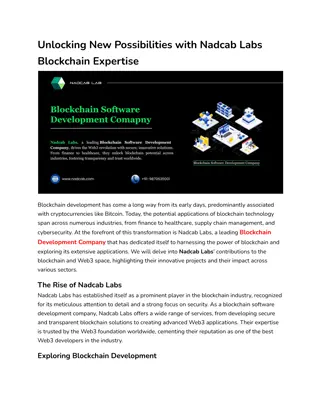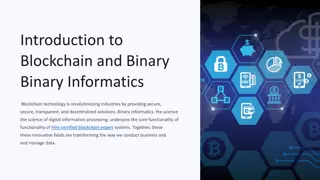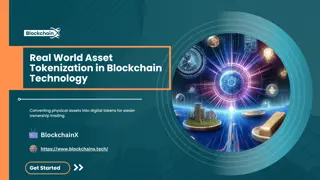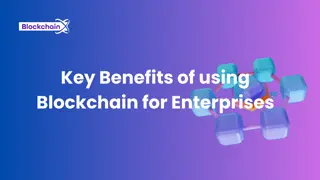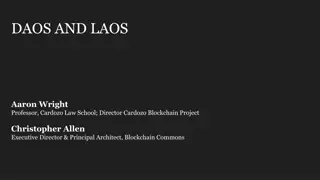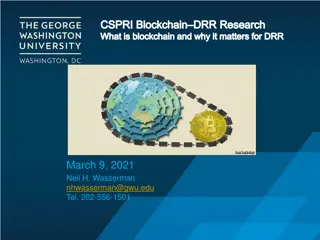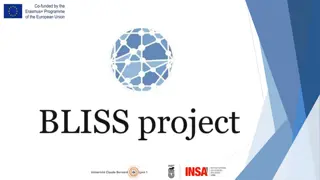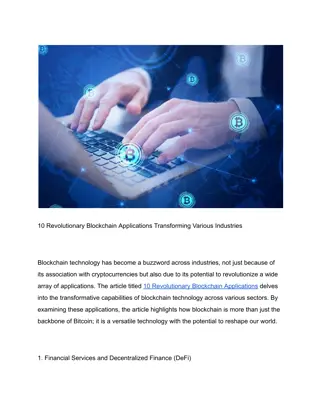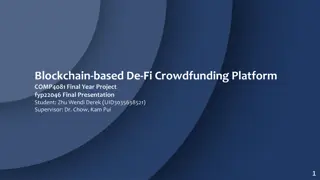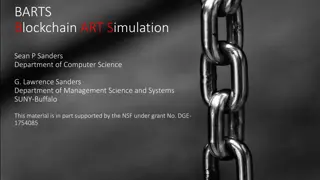Cost Functions in Blockchain Technology
Explore the concept of cost functions in blockchain technology, focusing on hashcash, properties of a good cost function, interactive and non-interactive cost functions, and the non-interactive variant of hashcash. Understand the key characteristics and functions of cost functions in the context of minting tokens and maintaining security in decentralized systems.
Download Presentation

Please find below an Image/Link to download the presentation.
The content on the website is provided AS IS for your information and personal use only. It may not be sold, licensed, or shared on other websites without obtaining consent from the author.If you encounter any issues during the download, it is possible that the publisher has removed the file from their server.
You are allowed to download the files provided on this website for personal or commercial use, subject to the condition that they are used lawfully. All files are the property of their respective owners.
The content on the website is provided AS IS for your information and personal use only. It may not be sold, licensed, or shared on other websites without obtaining consent from the author.
E N D
Presentation Transcript
American Bar Association Section of Dispute Resolution 22ndAnnual Spring Conference ARBITRATING BLOCKCHAIN, SMART CONTRACT & SMART LEGAL CONTRACT DISPUTES Peter L. Michaelson, Esq. Sandra A. Jeskie, Esq. May 2020 DM1/10928694.1
Speakers PETER L. MICHAELSON, ESQ. Michaelson ADR Chambers, LLC New York, NY and Rumson, NJ SANDRA A. JESKIE, ESQ. Partner, Duane Morris LLP San Diego, CA and Philadelphia, PA 1
Presentation Topics Purpose of Presentation Presentation Sections: Background Legal Contracts, Smart Contracts and Smart Legal Contracts ( smart agreements ) Technologies: Blockchains and Blockchain Ledgers Smart Contracts and Smart Legal Contracts Technical Issues that Can Lead to Liability Legal Issues Arbitration of Blockchain-related Disputes Salient Arbitration Clauses 2
Background The Importance of Trust All transactions are based on trust Without trust, trusted intermediaries are necessary Parties traditionally trust ledgers Ledgers record exchanges of value and allow individuals and businesses to establish trust in what each owns, what each is owed and what each owes others Conventional ledgers can be prone to fraud (e.g. Bernie Madoff, Enron, Lehman Bros.) Need a bookkeeping system in which participants can place absolute trust, i.e. can't be compromised. 3
Solution: Blockchain Distributed Ledgers Blockchain Distributed Ledgers are: Immutable provides unassailable trust across spectrum of transactions Transparent transactions are stored in corresponding blocks on a blockchain Secure Free from corruption Tamper-evident 4
Overview: Smart Contracts, Legal Contracts, Smart Legal Contracts Smart Contract: "Smart" just means that there is computer-based processing (execution). no contract no "intelligence" Externally-applied data processed through conditional logic associated with a block on a blockchain to invoke a particular operation(s) on transaction data stored in that block. Legal Contract Oral or written, non-computer implemented contract 5
Overview: Smart Contracts, Legal Contracts, Smart Legal Contracts A fundamental difference between Smart Contract and a Legal Contract: Enforcement mechanism Smart Contract automatically enforces a relationship specified in code no independent means of enforcement executes when a predefined condition occurs Legal Contracts not self-enforcing require intervention of legal authority (court or arbitral tribunal) Often rely on subjective human judgement and are incapable of being represented by condition-based functions in code e.g., assessing good faith, reasonableness, force majeure, best efforts, etc. 6
Overview: Smart Contracts, Legal Contracts, Smart Legal Contracts Smart Legal Contract: Capable of self-executing terms on a legally-enforceable basis Contains both "smart" portion (computer-executed code) and "non-smart" portion code invokes automatic performance based on the occurrence of a predefined event Non-executable portion contains all other contractual provisions agreed to by the parties Definitions Jurisdiction force majeure, etc. 7
Overview: Smart Contracts, Legal Contracts, Smart Legal Contracts Accord Project Non-profit open-source consortium Developing an open, standardized format for Smart Legal Contracts along with a software ecosystem and open-source tools to: Digitize new or existing legal contracts Connect them to web services and Deploy them to the cloud or a blockchain platform, including cloud-based Blockchain as a Service (BaaS) 8
Overview: Smart Contracts, Legal Contracts, Smart Legal Contracts Global Legal Blockchain Consortium (GLBC) Non-profit organization focused on driving adoption and standardization of blockchain in the legal industry Goal is to achieve data integrity, authenticity and privacy within the legal community and improve security and interoperability of the global legal technology ecosystem Collaborative development of standards to govern the use of open source blockchain technology in the business of law. AAA is spearheading the establishment of a GLBC-sponsored ADR Community of Interest to explore "on- chain" and "off-chain" arbitration of blockchain disputes. 9
Smart Legal Contracts What's driving the development of Smart Legal Contracts? COST Increase efficiency through use of computer automation Reduce cost of contract development and maintenance far Eliminate need and costs to monitor execution and undertake legal enforcement 10
SMART Contract Examples Securing US Electrical Grid US DOE awarded Carnegie-Mellon Univ. $400K grant to develop methodologies to substantially harden SCADA by placing incoming data on Blockchain Ledgers. Protecting US Food Supply Chain Blockchain Ledgers can be used to quickly trace origin and provenance of contaminated foodstuffs back to their sources Find sources of counterfeit or faulty goods Trace origin and provenance of previously shipped goods, including investigating industry certifications, Track restricted or dangerous components, and Discover storage anomalies. 11
Typical Blockchain Block Block n Block Hash: 0000087ea2ffe94 Previous Block Hash: 00000057ec2fda71 Transaction data: Hash: fea359ad27c907d 12
Interconnected Blockchain Blocks Block n-1 Block n Block n+1 Block Hash: 0000087ea2ffe94 Block Hash: cae543cfa2fda71 Block Hash: 00044bf2efe32 Previous Block Hash: 00000057ec2fda71 Previous Block Hash: 0000087ea2ffe94 Previous Block Hash: cae543cfa2fda71 Transaction data: Hash: 76f0ec56ce04423 Transaction data: Hash: e54cdf1672ea091 Transaction data: Hash: 8d0df86ffc15cd6 13
Conventional Four-node Business Network Party B Computer Transaction Data Ledger B Party C Computer Party A Computer Transaction Data Data Network (Internet) Transaction Data Ledger C Ledger A All nodes have their own separate databases Party D Computer Transaction Data Ledger D 14
Four-node Blockchain Network Node 2 Party B Computer Transaction Data Blockchain Node 1 Node 3 Party C Computer Party A Computer Blockchain Transaction Data Data Network (Internet) Transaction Data Blockchain All nodes have same replica of the blockchain (and ledger) Node 4 Party D Computer Blockchain Transaction Data 15
New Block Generation Node 2 Party B Computer Blockchain 3 Request to Add New Block Node 3 Node 1 Party C Computer Party A Computer 4 Transaction Data Data A Data Network (Internet) Blockchain Blockchain New block 1 A 2 Node 4 Party D Computer Blockchain 16
Validity Determination Node 2 Party B Computer Blockchain 5 Block Valid: YES 6 Node 2 reports new block is Valid Node 1 Node 3 Party A Computer Party C Computer 7 Blockchain Blockchain Data Network (Internet) 5 Block Valid: YES Block Valid: YES 5 Node 4 Party D Computer Blockchain 5 Block Valid: YES 17
Appending New Block To Blockchain Node 2 Party B Computer Blockchain A 11 9 Node 1 Node 3 Add New Block Party A Computer Party C Computer 10 Blockchain A 11 Blockchain A Data Network (Internet) 11 Consensus Reached: YES 8 Node 4 Party D Computer Blockchain A 11 18
Node Computer Blockchain Node Computer Executable contract provisions and textual provisions Blockchain Conditional processing code Legal template processing code Smart Legal Contract Components Smart Contract Components Measured transaction data Measured transaction data "Oracle" Physical Environment Physical Environment Sensor Sensor Smart Contract Implementation Smart Legal Contract Implementation 19
Technical Issues That Can Lead to Liability 20
Technical issues Coding Errors As the complexity of code increases, errors (bugs) become increasingly likely to occur can lead to adverse effects and attendant legal liability. Examples: 2017 A vulnerability in a popular cryptocurrency wallet ("Parity" which operates as a smart contract) froze $280M worth of Ether (digital token used in Ethereum blockchain) it contained. Vulnerability allowed users to change the code of the wallet and become owners of wallets that did not belong to them. One person "suicided" the Parity wallet by accidentally triggering the bug, then deleted the wallet code and by doing so froze all Ether tokens contained in that wallet which prevented other users from moving funds out. 2016 A known vulnerability in smart contracts used by The Distributed Autonomous Organization ("The DAO") led to an unauthorized transfer of $53M from The DAO. 2016 National University of Singapore researchers analyzed 19,366 Ethereum smart contracts and found 8,833 of them had bugs.* *Loi Luu et al, "Making Smart Contracts Smarter", Proceedings of the 2016 ACM SIGSAC Conference on Computer and Communications Security, Oct. 2016, p. 254-269, accessible at https://doi.org/10.1145/2976749.2978309. 21
Technical issues "The DAO" exploit: what happened when a code flaw is exploited What is a DAO? decentralized, (fully) autonomous organization (DAO) with no single leader. code forms a collection of Smart Contracts runs independently (self-autonomously) of human intervention as long as it covers its survival costs and provides a useful service to its participant base. What happened? Participant exploited a known vulnerability in The DAO's code $53 Million from The DAO itself into his own account The DAO's code functioned as intended 22
Technical issues The Dilemma. . . Where the funds stolen? Was the transfer legal because code executed as written? 23
Technical issues Bottom Line: Coding errors are common Errors can lead to substantial liability Authors Administrators Parties Mitigate Risk with insurance when possible 24
Technical issues Design Flaws Defects in underlying algorithm and/or design of the code 25
Legal Issues 26
Legal Issues Contract Formation Contract formation requires: Offer Acceptance Consideration Possible Formation Problems with Smart Contracts Mistake or absence of mutual assent where the programmer of the smart contract does not properly code the intent of the parties due to: Design Flaws Coding Bugs 27
Legal Issues Contract Interpretation Contract interpretation - intent of the parties is the most litigated dispute. In traditional contract, may look to Restatement (Second) of Contracts. Determine parties' subjective understanding of the agreement. Look to the meaning of controlling words in their ordinary context. Interpret writing as a whole. Consider parties' course of performance . In a smart contract. Faulty/incorrect data input could substantially change the performance of the contract away from that intended by the parties. 28
Legal Issues Defenses Frustration of purpose. In a traditional contract, a contract is voidable when certain unforeseen circumstances change after the contract was created, i.e. force majeure conditions. In a smart contract, how do the parties unwind a contract? Performance issues that may frustrate the purpose of the contract. Speed/latency execution throughout the entire blockchain may be too slow. 29
Legal Issues Defenses Speed/latency - some transactions can take a week as a result of: Block size Blocks are batches of transactions that get confirmed and shared on the public ledger (blockchain) Ethereum's block size is based on complexity of contracts run Block time i.e. processing time Network congestion i.e. capacity and throughput Transaction fees More complex smart contracts are charged higher fees (i.e. "gas rates") "Gas" is a unit of Ether spent on operating transactions on the Ethereum network 30
Legal Issues Governing Law Which Law Governs the Contract? Contract law is a matter of state law. Governing substantive law is usually specified in the contract, e.g., substantive law of the State of New York. If no choice of law provision exists, then the substantive law is typically that of the seat of arbitration set forth in the contract. Validity and arbitrability of the contract is based on applicable state law. State law restrictions regarding the subject matter of a contract. Ex. - greater cancellation rights beyond that permitted in common law on certain contracts in some states. 31
Legal Issues Jurisdiction Challenges Where does a court have physical jurisdiction over a blockchain? Blockchain is a decentralized structure of information: stored bits effectively disbursed over many locations, particularly in a BaaS implementation Can't reach out and touch "bits" they have no physical structure Traditional measures of physical judicial jurisdiction, in personam and in rem, may fail Absent agreement between the parties no national/state court will likely have physical jurisdiction 32
Legal Considerations Inflexibility "The Code is the Law" - what the code says governs Code must implicitly or explicitly declare what will happen as a result of every possible event Nearly impossible or at least too costly for contract drafters to anticipate every possible eventuality How are unanticipated events handled in a contract? Assume a default or error state pending human intervention? contrary to autonomous, self-executing nature of a smart agreement. Report event to the blockchain, then reset itself? Rely on a library of codified provisions that integrate an arbitral process into a Smart Legal Contract and allow parties to pause, resume, modify and end the contract. under development by CodeLegit 33
Legal Considerations Cybersecurity Security Breaches Since 2017, nearly $2 billion worth of cryptocurrency has been stolen. Smart contract vulnerabilities: Protocol Software client Exchanges Failure to properly secure data in the smart contract can lead to liability New laws, like CCPA, include a private right of action, statutory damages and class actions for data breaches Federal and state breach notification laws impose reporting obligations Corrective action must be taken to remediate breach and prevent its reoccurrence 34
Legal Issues - Privacy Information stored in a Blockchain Ledger, e.g. financial, medical or confidential consumer information, is subject to applicable privacy laws: Health Insurance Portability and Accountability Act (HIPAA) Gramm-Leach Bliley Act (GLBA) California Consumer Privacy Act (CCPA) EU General Data Protection Regulation (GDPR) Other federal and state laws To the extent these laws apply, design of Blockchain Ledger must fully comply with them. Many systems link aspects of a user's identity to his/her address. New privacy laws (CCPA and GDPR) protect any information that directly or indirectly identifies an individual. Level of privacy/confidentiality can vary depending on whether the smart contract is stored on a public, private or hybrid blockchain. Be mindful of privacy and security considerations. 35
Legal Issues Legal Enforceability ESIGN and UETA Enacted to help ensure the validity of electronic contracts and the defensibility of electronic signatures Electronic Signature in Global and National Commerce Act (ESIGN): Accords electronic signatures and records same legal status as inked signature and paper-based records Uniform Electronic Transactions Act (UETA): Enacted in 47 states, DC, Puerto Rico and US Virgin Islands; 3 other states: Washington State, NY and Illinois have similar acts in place Addresses when electronic records have been sent and received Compliance with ESIGN and UETA may be necessary with smart legal contracts 36
Legal Issues Other State Actions 2019 statutes enabling use of Blockchain Ledgers in smart agreements or for use in storing certain records: Illinois May 29, 2019 Maryland April 30, 2019 Nevada July 7, 2019 Texas June 10, 2019 State established a taskforce to implement and expand blockchain technology in the state: Florida May 23, 2019 States amended their state UETA to recognize blockchain technology: North Dakota and Oklahoma late April 2019 Nevada June 7, 2019 37
Arbitration The Only Viable Approach for Resolving Blockchain-related Disputes Advantages, Procedural Considerations and Clauses 38
Why Arbitration? Currently, there are no uniform standard arbitration procedures for arbitrating disputes involving Smart Contract and Smart Legal Contracts Fully automated platforms (e.g., Kleros) are being developed Practical approach Administrator of a Blockchain Ledger to impose a contractual framework onto all participants: Specify a arbitral forum (e.g. AAA/ICDR or other institution) to bring disputes with enforcement Define a specific process, Set forth a governing rule set Define or reference governing substantive law 39
Advantages: Confidentiality - Protection of Proprietary Information Arbitration proceedings are a private process. AAA staff and AAA neutrals have an ethical obligation to keep information confidential. The parties have a right to disclose details of the proceeding, unless they have a separate confidentiality agreement in place. AAA Statement of Ethical Principles", https://www.adr.org/StatementofEthicalPrinciples 40
Advantages: Confidentiality - Protection of Proprietary Information Privacy and security of personal/confidential information is a shared responsibility Arbitral institution, parties, their representatives and arbitrators AAA is addressing data security and privacy: Established best practice policies, procedures and technologies Mandatory cybersecurity training of staff and panelists Panelists to address cybersecurity during preliminary hearing Published AAA-ICDR Best Practices Guide for Maintaining Cybersecurity and Privacy 41 41
Advantages: Specialized Knowledge of the Tribunal Smart contract disputes will likely include highly technical issues. Parties have the opportunity to select neutrals with appropriate technical and legal credentials. Arbitration clause may require arbitrators to have experience in software development/coding. Arbitral institutions and its neutrals can easily adapt the arbitration and related procedures to meet the needs of: Parties and New types of dispute, such as smart contracts and other developing technology 42
Advantages: Procedural Flexibilities Formulation of Specific AAA/ICDR Rule Set for Smart Contract & Smart Legal Contract Disputes Under the AAA Commercial Arbitration Rules, parties are completely free and have total autonomy to decide what specific steps they will use and when, and all related aspects, subject only to affording mutual due process. Rule sets are broad and malleable to provide parties with latitude to adapt the process to fit the characteristics of their dispute. "Fit the process to the fuss" 43
Advantages: Procedural Flexibilities Blockchain transactions may occur quickly Arbitral proceedings must be: Focused Short to minimize impact on ongoing transactions Useful procedural techniques: Limit available time for the proceeding: Concentrate on the core issue(s) in contention If the time is very short, discovery and motion practice would be eliminated. can yield significant cost savings. Consider emergency arbitration type proceeding as a starting point for process design. Art 6 ICDR International Arb. Rules and AAA Comm. Arb. Rule 38. 44
Advantages: Procedural Flexibilities Evidence and arbitration submissions may reside on blockchain Arbitrators must have: secure, read access to stored transactions on the blockchain software to access, read and copy transaction information from individual blocks permissions, cryptographic keys and/or other credentials necessary for software Web-based multi-site videoconferencing in lieu of traditional in-person or even telephonic hearing 45
Arbitration Clauses Arbitral Seat Seat provides the framework for the arbitration Award may be challenged in the courts of the seat Law of the seat provides the procedural law (lex arbitri) for the arbitration: Consent to arbitration; Tribunal's authority, powers, and duties; Conflict of law rules; Costs and interest for award; Form and validity of the award and grounds for challenges to the award; and Powers of the court to hear disputes relating to arbitration Because smart contracts are geographically distributed by nature: Agree to seat in advance Consider if: Smart contract is legal and enforceable in desired seat and place of likely enforcement Disputes are arbitrable and accompanying awards enforceable 46
Arbitration Clauses Consent to Arbitrate New York Convention, Article II Agreement to arbitrate in "writing" and signed unless in the form of letters/telegrams Consent in a smart contract Is code considered a writing? Is execution of the code considered a signing of the agreement? Consider a Hybrid or Ricardian Contract Cryptographically signed and verified document first introduced in 1995 Human readable legal agreement After signing by it is converted to a machine readable contract and executed on the blockchain network 47
Arbitration Clauses Enforceability Incorporate arbitral clauses, governance and/or automatic enforcement mechanisms to limit judicial intervention or to facilitate enforcement of arbitral or judicial decisions: Escrow provision where necessary Provisions to automatically stop performance when dispute occurs Provision for automatic referral of dispute to AAA/ICDR Permit return of funds or other assets by providing access by Smart Legal Contracts to certain accounts funded by the parties 48
Arbitration Clauses International: New York Convention approx. 160 member states does not specify type or mode of arbitral award for it to be valid and enforceable. does not appear to impede recognition and enforcement of blockchain-based Smart Legal Contract awards, authenticated in code Possible that awards may be valid and enforceable Validity of award is a question of domestic law in member state in which enforcement is sought Some jurisdictions may be more willing to recognize and enforce Smart Legal Contract code-based awards than others No existing jurisprudence 49
